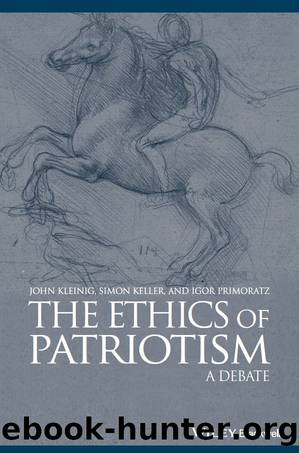The Ethics of Patriotism: A Debate by John Kleinig & Simon Keller & Igor Primoratz

Author:John Kleinig & Simon Keller & Igor Primoratz [Kleinig, John & Keller, Simon & Primoratz, Igor]
Language: eng
Format: epub
ISBN: 9781118328040
Publisher: Wiley
Published: 2015-01-12T00:00:00+00:00
Mason goes on to claim:
Part of what it is to be a citizen is to incur special obligations: these obligations give content to what it is to be a committed or loyal fellow citizen and are justified by the good of the wider relationship to which they contribute. In particular, citizens have an obligation to each other to participate fully in public life and an obligation to give priority to the needs of fellow citizens. (Mason 1997, 442)
I consider the first of these two special duties as pertaining to citizenship, rather than being specific to patriotism. Therefore, it can be put to one side. It is the second duty that is at issue. If we indeed have a duty of special concern toward compatriots and if that is an associative duty, that is because our association with them is intrinsically valuable and bound up with this duty. The claim about the intrinsic value of our association might be thought a moot point. But even if it were conceded, one might still resist the claim concerning the alleged duty. If someone were to deny that she has a duty of special concern for the well-being of her country and compatriots, beyond what the laws of her country mandate and beyond the concern she has for humans and humanity, would she thereby cease to be a citizen (in the sense involving equal standing)? If she were to deny that citizens generally have such an obligation, would that betray a lack of understanding of what citizenship (in the relevant sense) is? If she came across two strangers in a life-threatening situation and could only save one, would she have a prima facie moral duty to save the one who was a compatriot? Masonâs position commits him to answering âyesâ in each case, but all three claims are implausible.
If Mason were to stick to his guns and embrace these implications of his view, how could the issue be settled? I propose to settle it by borrowing an argument Bernard Williams deployed to a different purpose: that of âone thought too many.â Williams introduced this argument in the context of critique of the type of ethical theory that accords no intrinsic moral significance to personal attachments and allows for them only to the extent that they can be justified by some universal, impartial moral considerations. A man comes across two persons in a life-threatening situation and can only save one. One person is a complete stranger, while the other is the manâs wife. Obviously, he may, and indeed should, save his wife; the theory Williams criticizes does not deny that. The flaw Williams highlights is that the theory would see this choice as something that needs to be justified and would seek to justify it by showing that such partiality is allowed by a universal, impartial moral rule:
⦠Surely this is a justification on behalf of the rescuer, that the person he chose to rescue was his wife? [â¦] But something more ambitious than this
Download
This site does not store any files on its server. We only index and link to content provided by other sites. Please contact the content providers to delete copyright contents if any and email us, we'll remove relevant links or contents immediately.
Collaborating with Parents for Early School Success : The Achieving-Behaving-Caring Program by Stephanie H. McConaughy; Pam Kay; Julie A. Welkowitz; Kim Hewitt; Martha D. Fitzgerald(899)
Entrepreneurship Education and Training: The Issue of Effectiveness by Colette Henry Frances Hill Claire Leitch(666)
Adding Value to Policy Analysis and Advice by Claudia Scott; Karen Baehler(499)
Materializing the Middle Passage by Jane Webster;(497)
Race and American Political Development by unknow(490)
Sociological Perspectives of Health and Illness by Constantinos N. Phellas(479)
American Government and Politics Today by Steffen W. Schmidt Mack C. Shelley Barbara A. Bardes(477)
Human and Global Security : An Exploration of Terms by Peter Stoett(473)
Control Of Oil - Hardback by Kayal(468)
Advances in Child Development and Behavior, Volume 37 by Patricia J. Bauer(403)
The Disappearance of Rituals: A Topology of the Present by Byung-Chul Han(401)
The Catholic Church and European State Formation, AD 1000-1500 by Jørgen Møller(393)
The World According to China by Elizabeth C. Economy(387)
Theories of Counseling and Psychotherapy: A Case Approach by Nancy L. Murdock(380)
Left Is Not Woke by Susan Neiman(371)
Application of classical statistics, logratio transformation and multifractal approaches to delineate geochemical anomalies in the Zarshuran gold district, NW Iran by unknow(365)
Cross-Cultural Child Development for Social Workers by Lena Robinson(358)
Turkey's Relations with the West and the Turkic Republics: The Rise and Fall of the Turkish Model by Idris Bal(353)
Japan's Ainu Minority in Tokyo by Mark K. Watson(341)
